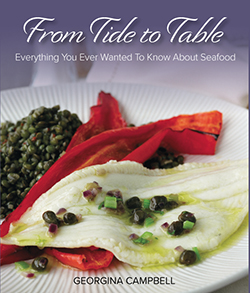The Darina Allen Column

This month Darina reminds us of the importance of the small shops that we so often value only when it is too late - and her favourite new recipes include a variation on the classic scone and a delicious way to cook that much maligned vegetable, the Brussels sprout.
There’s lots of grizzle about ‘over here’ but we have a lot to be grateful for too. I recently spent a weekend with friends in the UK in a prosperous part of middle England.
The local village had neither pub nor local shop and the nearest town (about the size of Midleton) had five supermarkets, two of which were discounters. There was not a single food shop or deli and only one butcher hanging on by his fingernails.
The main street had several estate agents, betting shops, a Spec Savers, a couple of charity shops, several fast food outlets and a Boots.
At one point the conversation at dinner centred around two nearby villages where the local community were desperately trying to save the last local shop. In Dymock in the Forest of Dean the last remaining pub in the village was destined to be a housing development so the locals joined with the parish council to buy the Beauchamp Arms for the community.
Here in Ireland it’s not easy for small shops to survive either, especially in the current climate. Low, and below-cost-selling makes it impossible to compete on price.
However, an emerging trend brings a flicker of hope; both in the US and in the UK smaller shops are beginning to pop up again and apparently there is a craving for a more personal type of shopping experience.
The Mary Portas TV Series on Channel 4 — Mary Queen of Shops — about the demise of the high street and small shops which highlighted the problem.
RECIPES:
Brussels Sprouts with Toasted Hazelnuts and Candied Bacon
Brussels sprouts are the number one most hated vegetable. The poor little sprout has had very bad press, mostly because it can be tough to cook well.
If you follow the conventional wisdom to cut a cross in the base and boil them, you are pretty much guaranteed the result that has condemned the sprout to its appalling reputation. However, hazelnuts and bacon have a natural affinity with sprouts.
Serves 6?
500g (18oz) Brussels sprouts
25g (1oz) butter
62ml (2½ fl oz) homemade chicken stock
Salt and freshly ground black pepper
50g (2oz) hazelnuts
6 slices lightly smoked streaky bacon —?approximately 110g (4oz)
40g (1½ oz) soft pale brown sugar
Garnish?2 tbsp fresh parsley, chopped
Trim the sprouts, cut in halves and shred thinly.
Preheat the oven to 200C/400F/Gas Mark 6.
Toast the hazelnuts on a baking tray in a preheated at 180C/350F/Gas Mark 4 for 15 minutes, shaking regularly until golden and skin.
Allow to cool, then chop coarsely.
Cover a baking tray with a sheet of parchment paper. Dip the streaky bacon in pale soft brown sugar so both sides are coated.
Cook for 10-15 minutes until the bacon is caramelised on both sides. Remove from the oven and allow to sit for a minute or two and remove to a wire rack to crisp up.
Meanwhile, over a medium high heat, melt the butter in a sauté pan. When it foams add the shredded sprouts, toss to coat, add the chicken stock, cover and allow to cook for 4-5 minutes tossing regularly. Season well with salt and freshly ground black pepper.
The sprouts should be still fresh and green. Snip the bacon into uneven pieces with scissors.
Add most of the coarsely chopped hazelnuts and candied bacon. Toss, taste and correct seasoning.
Turn into a hot serving dish.
Sprinkle with the remaining hazelnuts, candied bacon and chopped parsley. Serve immediately.
Emily’s Poppy Seed and Lemon Scones
Emily Johnson from Switzerland recently did this delicious? variation on our scone recipe.
Makes 18-20 scones, using a 3 inch (7½ cm) cutter
2lb (900g) plain white flour
6ozs (175g) butter
Pinch of salt?2oz (50g) castor sugar
3 heaped tsp baking powder
Rind of one lemon
4 tbsp of poppy seeds
3 free-range eggs
15 fl ozs (450ml) approx. full cream milk?to mix (not low fat milk)
Egg wash (see below)
2 ozs (50g) granulated sugar for top of scones
Lemon Butter?3 tsp finely grated lemon rind
6 ozs (175g) butter
7 ozs (180g) icing sugar
Preheat the oven 250C/475F/regulo 9.
First make the lemon butter. Cream the butter with the finely grated lemon rind. Add the sifted icing sugar and beat until fluffy.
Sieve the flour into a large wide bowl; add a pinch of salt, the baking powder and castor sugar. Grate the rind of one lemon on the finest part of the grater over the dry ingredients in the bowl. Add the poppy seeds.
Mix the dry ingredients with your hands, lift up to incorporate air and mix thoroughly. Cut the butter into cubes, toss well in the flour and then with the tips of your fingers rub in the butter until it resembles large flakes.
Make a well in the centre. Whisk the eggs with the milk; pour all at once into the centre.
With the fingers of your ‘best hand’ outstretched and stiff, mix in a full circular movement from the centre to the outside of the bowl. This takes just seconds and hey presto, the scone dough is made.
Sprinkle some flour on the work surface. Turn out the dough onto the floured board. Scrape the dough off your fingers and wash and dry your hands at this point.
Tidy around the edges, flip over roll out to about 1inch thick and cut or stamp into scones. Put onto a baking sheet. No need to grease.
Alternatively roll out the scone dough or pat gently into a rectangle about 3/4 inch (2cm) thick.
Spread the soft lemon butter over the surface. Roll up lengthwise and cut into pieces about 1 1/4 inch (3cm) thick.
Brush the tops with egg wash (see below) and dip the tops only in granulated sugar. Put onto a baking sheet fairly close together. Bake in a preheated oven for 10-12 minutes or until golden brown on top.
If making classic scones, cool on a wire rack. Serve, split in half with lemon butter - delicious.
Egg Wash - Whisk one egg thoroughly with about a dessertspoon of milk. This is brushed over the scones to help them brown in the oven.
Practical Tip - Scone mixture may be weighed up ahead - even the day before. Butter may be rubbed in but do not add raising agent and liquid until just before serving.
Watercress, Blood Orange and New Seasons Toonsbridge Mozzarella Salad
The rich West Cork pasture that the buffalos feed on gives the Toonsbridge Mozzarella its quintessentially Irish taste. A few beautiful fresh ingredients put together simply make an irresistible starter.
Just before serving, scatter a few watercress leaves over the base of each plate, slice or tear some mozzarella over the top.
Serves 4
2-3 balls of fresh Toonsbridge Mozzarella
2 blood oranges
A bunch of fresh watercress
2-3 tbsp Irish honey
A good drizzle of extra virgin olive oil
Some coarsely ground black pepper
With a sharp knife remove the peel and pith from the blood oranges, cut into ¼ inch (5mm) thick slices, tuck a few here and there in between the watercress and mozzarella.
Drizzle with honey and really good extra virgin olive oil. Finally add a little coarsely ground fresh black pepper and serve.
Kale, Fennel, Radish and Parmesan Salad
Keep the sliced fennel and radishes in iced water for at least 5 minutes before use.
Serves 4 as a starter
150g (5oz) green curly kale, stalks included
110g (4oz) fennel thinly sliced
8 French Breakfast radishes thinly sliced at a long angle
4 tbsp grated Parmesan cheese
3 tbsp extra virgin olive oil
1 tbsp lemon juice
Salt and freshly ground pepper.
Remove the stalks from the kale and shred very finely.
Put some kale, drained fennel and radishes into a bowl. Drizzle with extra virgin olive oil and lemon juice.
Grate on some Parmesan with a slivery micro plane.
Season with salt and freshly ground pepper. Toss and taste and serve.
'30 Years at Ballymaloe' - Bord Gáis Avonmore Cookbook of the Year 2013
Good Food Ireland Cookery School of the Year 2012/2013
Ballymaloe Literary Festival of Food and Wine from 16 - 18th May 2014
***
 Once again, the Ballymaloe Cookery School in East Cork has a great programme of cookery courses for all interests and abilities running throughout 2014. Ranging from a relaxing visit to sit in on an afternoon cookery demonstration to a week long ‘Intensive Introductory Course’.
Once again, the Ballymaloe Cookery School in East Cork has a great programme of cookery courses for all interests and abilities running throughout 2014. Ranging from a relaxing visit to sit in on an afternoon cookery demonstration to a week long ‘Intensive Introductory Course’.
Sitting in the middle of a 100 acre organic farm the Ballymaloe Cookery School provides its students not only with a life skill learnt under the expert tutelage of their very capable teachers but also a place to relax and unwind from the stresses and strains of normal everyday life. The cottage accommodation available onsite for residential courses consists of a collection of delightful converted outbuildings which have been transformed over the years by the Allens, and other accommodation is available locally for the short courses.
www.cookingisfun.ie






There are currently no comments
Leave a comment
Not a member? Register for your free membership now!
Or leave a comment by logging in with: